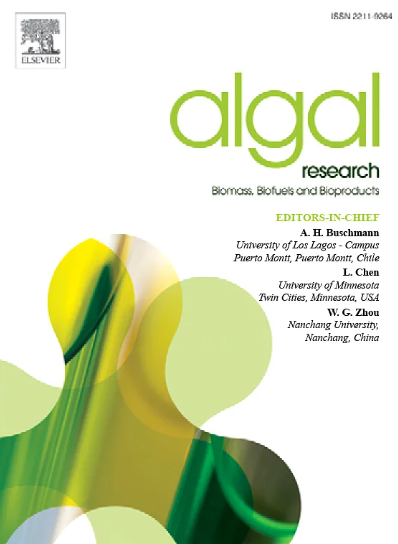补充小球藻降低成人心血管危险因素:一项分级评估的随机临床试验的系统评价和荟萃分析
IF 4.5
2区 生物学
Q1 BIOTECHNOLOGY & APPLIED MICROBIOLOGY
Algal Research-Biomass Biofuels and Bioproducts
Pub Date : 2025-08-30
DOI:10.1016/j.algal.2025.104281
引用次数: 0
摘要
背景:心血管疾病(CVD)在世界范围内构成了重大的健康挑战和危及生命的风险。减少心血管疾病的危险因素导致其患病率下降。小球藻是一种绿藻,具有有益的心脏代谢作用。方法系统检索Web of Science、Scopus和PubMed/Medline,截止2025年1月10日,根据PRISMA检查表和PICOS标准(人群:成人及18岁,干预:小球虫,比较:安慰剂/对照,结局:BMI、体重、hs-CRP、FBG、HOMA-IR、胰岛素、TG、TC、hdl、LDL-C、收缩压、舒张压和研究:rct),确定相关的随机对照试验(rct)。采用随机效应模型进行meta分析。GRADE框架用于评估证据的确定性。结果在25项研究(33个效应值)中,补充小球藻改善了血脂异常(TC: WMD = - 5.26 mg/dl, P < 0.001; LDL-C: WMD = - 7 mg/dl, P < 0.001; hdl: WMD = 2.34 mg/dl, P = 0.006),增强了胰岛素敏感性(HOMA-IR: WMD = - 0.31, P = 0.004),降低了血压(收缩压:WMD = - 3.68 mmHg, P = 0.005; DBP: WMD = - 2.04 mmHg, P = 0.04),降低了人体测量值(体重:WMD = - 1.37 kg, P = 0.001;体重指数:大规模杀伤性武器=−0.25 kg / m2, P & lt; 0.001),并降低炎症(hs-CRP:大规模杀伤性武器=−0.74 mg / dl, P & lt; 0.001)。补充小球藻对TG、FBG和胰岛素水平没有影响。GRADE分析显示hs-CRP和FBG的证据质量较低,TC、LDL-C和BMI的证据质量较高,其他参数的证据质量中等。结论:本系统综述和荟萃分析表明,补充小球藻可改善血压、人体测量、胰岛素敏感性、炎症标志物和血脂异常,可能有助于降低成人心血管疾病的风险。然而,需要更多的研究来证实这些事实。本文章由计算机程序翻译,如有差异,请以英文原文为准。
Chlorella supplementation diminishes cardiovascular risk factors in adults: A GRADE-assessed systematic review and meta-analyses of randomized clinical trials
Background
Cardiovascular disease (CVD) poses significant health challenges and life-threatening risks worldwide. Reducing risk factors for CVD has led to a decrease in its prevalence. Chlorella, a green alga, has beneficial cardiometabolic effects.
Methods
Systematic searches were performed in Web of Science, Scopus, and PubMed/Medline through January 10, 2025, to identify relevant randomized controlled trials (RCTs) according to the PRISMA checklist and PICOS criteria (Population: adults >18 years, Intervention: chlorella, Comparison: placebo/control, Outcomes: BMI, weight, hs-CRP, FBG, HOMA-IR, insulin, TG, TC, HDL![]() C, LDL-C, SBP, DBP, and Study: RCTs). A meta-analysis was conducted using random-effects models. The GRADE framework was used to assess evidence certainty.
C, LDL-C, SBP, DBP, and Study: RCTs). A meta-analysis was conducted using random-effects models. The GRADE framework was used to assess evidence certainty.
Results
In the 25 studies (33 effect sizes), chlorella supplementation improved dyslipidemia (TC: WMD = −5.26 mg/dl, P < 0.001; LDL-C: WMD = −7 mg/dl, P < 0.001; HDL![]() C: WMD = 2.34 mg/dl, P = 0.006), enhanced insulin sensitivity (HOMA-IR: WMD = −0.31, P = 0.004), lowered blood pressure (SBP: WMD = −3.68 mmHg, P = 0.005; DBP: WMD = −2.04 mmHg, P = 0.04), diminished anthropometric measures (weight: WMD = −1.37 kg, P = 0.001; BMI: WMD = −0.25 kg/m2, P < 0.001), and reduced inflammation (hs-CRP: WMD = −0.74 mg/dl, P < 0.001). Chlorella supplementation did not affect TG, FBG, and insulin levels. GRADE analysis showed low-quality evidence for hs-CRP and FBG, high-quality evidence for TC, LDL-C, and BMI, and moderate-quality evidence for other parameters.
C: WMD = 2.34 mg/dl, P = 0.006), enhanced insulin sensitivity (HOMA-IR: WMD = −0.31, P = 0.004), lowered blood pressure (SBP: WMD = −3.68 mmHg, P = 0.005; DBP: WMD = −2.04 mmHg, P = 0.04), diminished anthropometric measures (weight: WMD = −1.37 kg, P = 0.001; BMI: WMD = −0.25 kg/m2, P < 0.001), and reduced inflammation (hs-CRP: WMD = −0.74 mg/dl, P < 0.001). Chlorella supplementation did not affect TG, FBG, and insulin levels. GRADE analysis showed low-quality evidence for hs-CRP and FBG, high-quality evidence for TC, LDL-C, and BMI, and moderate-quality evidence for other parameters.
Conclusions
This systematic review and meta-analysis demonstrate that chlorella supplementation improves blood pressure, anthropometric measures, insulin sensitivity, inflammatory markers, and dyslipidemia, which may help lower CVD risk in adults. However, more studies are needed to confirm these facts.
求助全文
通过发布文献求助,成功后即可免费获取论文全文。
去求助
来源期刊

Algal Research-Biomass Biofuels and Bioproducts
BIOTECHNOLOGY & APPLIED MICROBIOLOGY-
CiteScore
9.40
自引率
7.80%
发文量
332
期刊介绍:
Algal Research is an international phycology journal covering all areas of emerging technologies in algae biology, biomass production, cultivation, harvesting, extraction, bioproducts, biorefinery, engineering, and econometrics. Algae is defined to include cyanobacteria, microalgae, and protists and symbionts of interest in biotechnology. The journal publishes original research and reviews for the following scope: algal biology, including but not exclusive to: phylogeny, biodiversity, molecular traits, metabolic regulation, and genetic engineering, algal cultivation, e.g. phototrophic systems, heterotrophic systems, and mixotrophic systems, algal harvesting and extraction systems, biotechnology to convert algal biomass and components into biofuels and bioproducts, e.g., nutraceuticals, pharmaceuticals, animal feed, plastics, etc. algal products and their economic assessment
 求助内容:
求助内容: 应助结果提醒方式:
应助结果提醒方式:


